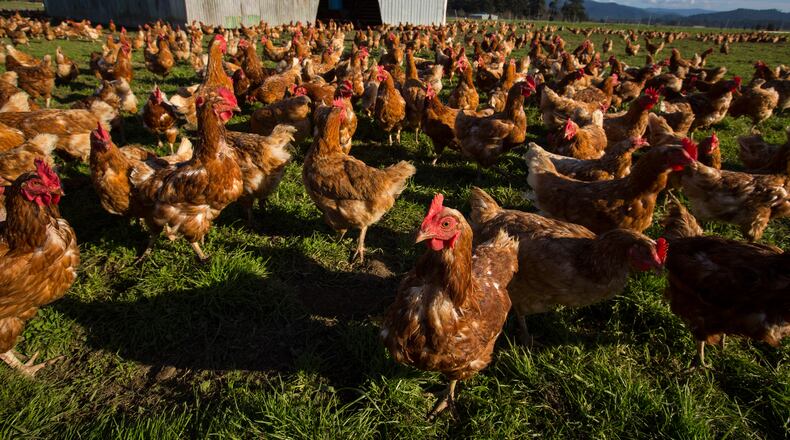>> Take the city of Dayton’s survey
The city wants thoughtful policies that encourage urban gardening and green and sustainable living, said Dayton Mayor Nan Whaley.
Getting rid of the urban chicken ban could benefit the foodie culture and promote healthy eating, Whaley said.
“It’s an opportunity on this idea of what a green community means and farm-to-table,” she said.
Some people, however, will need convincing, including Commissioner Joey Williams.
Williams said chickens are smelly and unhygienic and could degrade local neighborhoods.
“What I know so far, I would just as soon leave it” — the zoning code — “the way it is,” Williams said. “I do not want to see my neighbors’ chickens running through my yard.”
Other critics say hens can be noisy and troublesome neighbors.
On Wednesday, the city posted a survey on its Facebook page asking citizens to answer a variety of questions about chickens.
Survey-takers are asked about what types regulations they would want if they favor allowing chickens to be raised within city limits.
Choices include requiring people to get zoning certificates, restricting chickens to rear yards only and prohibiting outdoor slaughtering. The survey also asks respondents what the maximize allowable number of chickens should be on a property. There is a question about enclosure sizes.
The city will use the feedback to decide whether to pursue zoning text amendments to lift the restrictions on urban chickens, Whaley said.
“We want to make sure the whole community is engaged in it,” she said.
Many forward-thinking communities, including Pittsburgh, Pa., and St. Louis, Mo., have passed legislation to make it easier for their residents to raise domestic fowl, Whaley said.
More than 160 U.S. cities permit backyard chickens, according to some estimates, and Franklin County several years ago passed rules easing restrictions on raising chickens and other animals for personal use.
Hens produce fresh and nutritious eggs for families to eat, and birds can be raised for slaughter.
Hens would be for personal use and would support sustainable land use and healthy eating habits, Whaley said.
The city is not considering allowing people to keep roosters, which are notoriously noisy and are known to be sources of nuisance complaints, officials said.
“A dog next door would probably be more of an issue in a neighborhood than a chicken would be,” Whaley said.
People today are more passionate about food and they want health-conscious choices, said Kevin Fry, founder of Dayton Foodies, a group focused on highlighting the local dining scene.
Many people want to know where their food comes from, and backyard chicken coops would allow residents to bypass third-party providers, said Fry, who lives in Centerville.
Free-range chickens are appealing to many consumers because the birds are not locked in cages all day and generally are treated more humanely, Fry said.
Fresh eggs taste better, and yolks are generally firmer and have a deeper yellow color, he said.
“I think there are some very motivated people who would embrace this idea,” he said. “I think this could take off.”
But Commissioner Williams said he wants assurances that backyard coops do not become nuissance problems for neighbors.
Williams said he remembers seeing chickens run around at family farms in Texas. Currently, he feels they do not belong in the urban setting.
“They’re dirty, they’re nasty and they are hard to control,” he said.
Williams said he is willing to research the issue and wants to hear from residents.
He also wants to know how allowing urban animal agriculture has impacted people and neighborhoods in other communities.
Hens and birds raised for their meat can be loud and can attract hungry dogs, cats and other critters, said Jean Mattis, owner of KJB Farms, which is based in Miami County but has space at the 2nd Street Market.
“I don’t think they know what they are getting into,” she said. “It takes a lot of care and neighbors may not like them having chickens.”
The farm’s chickens are free range within their pens, but they need protections from coyotes and other predators, she said.
KJB Farms sells fresh eggs and chicken meat, and many customers ask about how the chickens were raised, clearly concerned about humane treatment, Mattis said.
Mattis said a change to the city’s zoning code could result in her losing some egg customers.
About the Author

